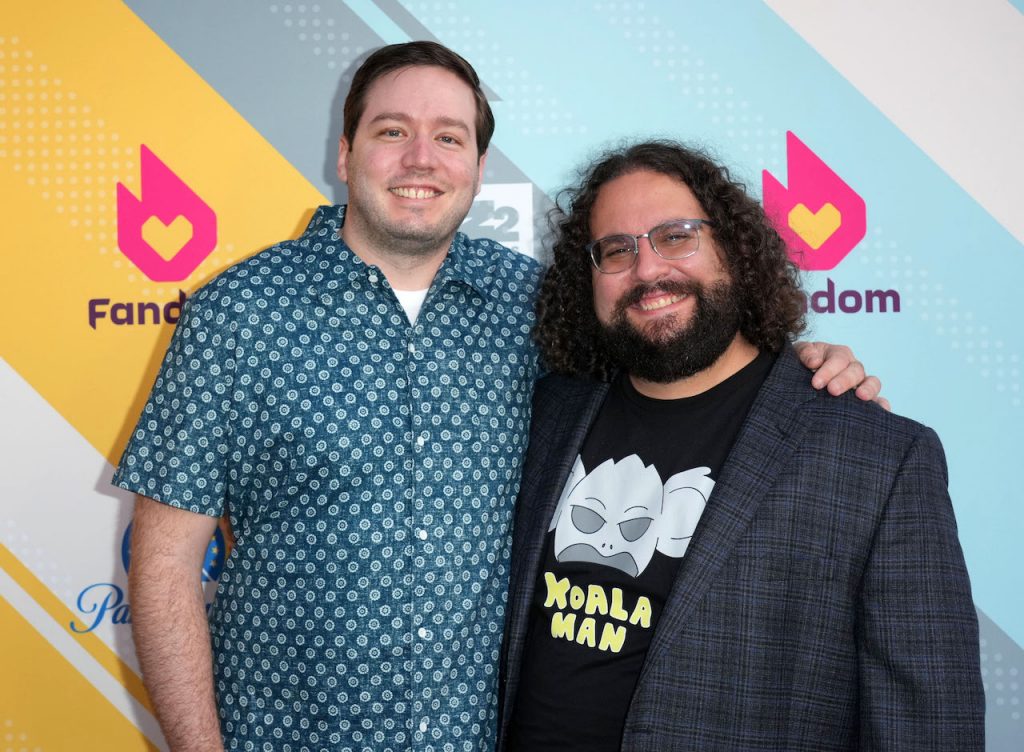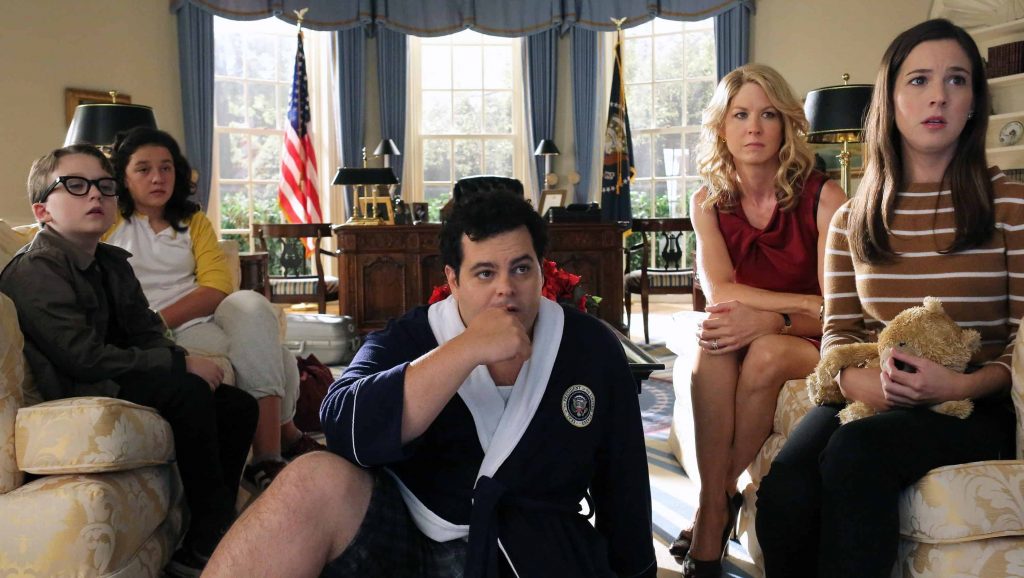- Writers Dan Hernandez & Benji Samit On Writing Partnerships
- Dan Hernandez & Benji Samit Talk Teenage Mutant Ninja Turtles: Mutant Mayhem (TMNT: MM)
The Meeting Of Minds
“We met at Brown University where we both went to college. I think that our initial bond was through silence,” says Dan.
“We both did a lot of theater in college so we were in similar circles, but for the first few years of college, we didn’t actually know each other.” says Benji. “We had always heard of each other, and we had a lot of mutual friends, but Dan was always working on one play while I was doing another play so we never crossed paths until we were in the beginning of our junior year of college and were working on the same show together.” The show included a swamp which eventually bloomed with algae and had power cables that ran dangerously close to the water.
“Once I accidentally knocked another actor off stage one night and I thought, ‘Oh, she’s dead. I killed her,'” recalls Dan. “And so, it was a very stressful production. I was called to tech for it and Dan was in the show,” adds Benji. I was up in the booth and Dan was down there, and we just kept like locking eyes during some of the more precarious moments of the process. I think we really just shared a common trauma.”
When it was time to strike down the set, Benji ran back to the tech booth and Dan followed needing a place to hide from draining that dreaded swamp. That was the first time they actually spoke. Dan Hernandez and Benji Samit have told this story many times during interviews, but they’re unsure if it won them any writing gigs.
Hernandez and Samit consider themselves to be writing partners rather than collaborators – the Lennon and McCartney of screenwriting. “We pretty much do everything together and we’re very co-dependent,” says Benji.
“I think that sometimes when people are starting out, there is a feeling that having a partner is easier than writing solo. And that can be true in certain respects. You certainly can double your work capacity in the right circumstances, but it also means having to have a symbiotic relationship with another brain. And that can be extremely daunting, especially if you’re not naturally inclined toward that,” adds Dan.
Being best friends also helps. “So much of my enjoyment is getting to show Benji what I’ve been working on or to try and impress him with something or to ask his opinion about something,” says Dan. “I always say is the most important for any partnership is – taste beyond skill – beyond expertise – beyond even creativity. If you are working in a partnership you have to have the same goal for what you’re going to create. If it’s too divergent, it ultimately puts a strain on the partnership that makes it impossible,” continues Hernandez.
A writing collaboration requires complementary traits. “Dan is really exceptional at not being daunted at all by the blank page,” says Benji. “I think one of the things that Dan appreciates about me is that I have a beautiful mind for some of the detailed work and the nitty gritty – getting in there and making sure everything tracks and is clear. Also, my editing.”
“It’s not to say that I can’t write from a blank page or Dan doesn’t edit. We are now in a place where we can do all of the different things, but I think those two things really complement each other, and in addition, what we bring out from each other. I think we both push each other to be the best we can be. If we have an idea and we see that the other person is not fully on board with it, it pushes us to think harder about beating that idea,” adds Samit.

Benji Samit & Dan Hernandez. Photo by MediaPunch/ Shutterstock
On Landing Their First Writing Job
“Getting that first staff job on 1600 Penn was a saga unto itself. It was the pre-work,” says Dan Hernandez. “I think Benji and I were finally staffed when we were twenty-seven or twenty-eight, but it felt like forever to us because it had been five or six years of us getting very close to breaking in and then not quite making it.”
Hernandez and his writing partner Benji Samit had staff meetings for popular network comedy shows like 30 Rock, The Office, American Dad, Community, and Parks and Recreation before finally landing a spot on 1600 Penn. Looking back, Samit appreciated this lengthy preparation period. They may have even forgotten a few showrunner meetings along the way.
Time and seeming lack of progress in being staffed is par of the course for screenwriters. “No screenwriter’s journey is fully able to be replicated. They are completely bespoke, they are completely unique, and the circumstances that come together that enable you to get that first job is different for every writer. There’s no path,” declares Hernandez. This is what makes career planning so frustrating for writers of all levels. “Getting that first job is a combination of preparation, skill, and an incredible amount of luck. And relationships with people.”
Benji Samit recalls how they fell short on a couple of interviews even after knocking on doors for years. On one occasion, a showrunner asked them how they would save the show during one interview on a TV show that was doing really well. They were twenty-three at the time. “We said, ‘The show’s fine. It’s doing great.’ And what I realized now, with the experience of having done it for a long time, is that that show was really asking us what we could do to be helpful to his show. And we failed that answer because we tried to spare his feelings. And I realize now that that was the exact wrong thing to do,” adds Hernandez.
On another occasion, they were asked what was the worst part of one particular pilot. At that point, team Benji and Dan decided to answer these types of questions as truthfully as possible. Their parlay into constructive criticism lead them to their first grown-up staffing gig on 1600 Penn in 2012.
Samit expands, “Showrunners are searching for solutions. And if you present that critique in a constructive way… say there’s an issue with this character, but if you do XYZ, I think that would really elevate them.” The writers contend that although some showrunners are precious, most are looking for writers to come in and say, “I read the pilot, I loved a lot of it, this really wasn’t working and this is why.”
Apart from these traits, most showrunners also want to know that they can work with you. Some invite pitches during the interview stage, while other don’t. “When you meet with enough showrunners, you start to learn how to read the vibe of each person,” says Hernandez.
“Some showrunners want to just talk about themselves and their process and other showrunners have a clear vision of what they want so they’re not looking for new ideas from the other writers as much as they’re looking for support and writers that can actually make stuff happen and enact their vision. There are other showrunners that are have a rough idea for a show, but are still figuring it out in the room,” Benji continues.
“When we first started, we had a dozen showrunner meetings before we landed our first job because it was a slow process of learning how to read those showrunners and figure out exactly how to ride the waves of those meetings.”
When their big break on 1600 Penn came around, the writers had the opportunity to go into the Pilot Punch Up. Preparation finally met opportunity and two writing careers were born. Penn was a popular sitcom and the studio executives already knew Hernandez and Samit from previous interviews on other TV series. It was a perfect alignment of the stars where they connected to a show and the executives at the same time.
A Pilot Punch Up isn’t what happens when the writers can’t creatively agree with the showrunner. “We wrote so many jokes… dozens of jokes on every page. We were over-prepared,” jokes Samit. “We pitched a hundred jokes on 1600 Penn and got a lot of then into the pilot and they made an impression.”
